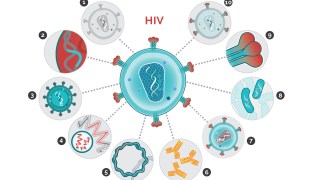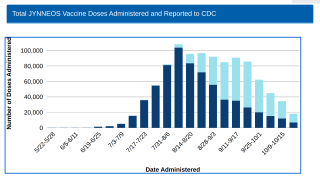FDA Approves the First Long-acting Regimen for HIV Treatment

The U.S. Food and Drug Administration (FDA) announced the approval of Cabenuva (cabotegravir and rilpivirine, injectable formulation) as a complete regimen for the treatment of human immunodeficiency virus type 1 (HIV-1) infection in adults.
This is the first FDA-approved injectable, complete regimen for HIV-infected adults administered once a month.
This approval replaces a current antiretroviral regimen in those who are virologically suppressed on a stable antiretroviral regimen with no history of treatment failure and with no known or suspected resistance to either cabotegravir or rilpivirine.
The FDA also approved Vocabria (cabotegravir, tablet formulation) on January 21, 2021, which should be taken in combination with oral rilpivirine (Edurant) for one month before starting treatment with Cabenuva to ensure the medications are well-tolerated before switching to the extended-release injectable formulation.
The FDA granted the approval of Cabenuva and Vocabria to ViiV Healthcare.
“Currently, the standard of care for patients with HIV includes patients taking daily pills to adequately manage their condition. This approval will allow some patients the option of receiving once-monthly injections in lieu of a daily oral treatment regimen,” said John Farley, M.D., M.P.H., director of the Office of Infectious Diseases in the FDA’s Center for Drug Evaluation and Research, in a press release.
“Having this treatment available for some patients provides an alternative for managing this chronic condition.”
The safety and efficacy of Cabenuva were established through two randomized, open-label, controlled clinical trials in 1,182 HIV-infected adults who were virologically suppressed (HIV-1 RNA less than 50 copies/milliliter) before initiation of treatment with Cabenuva. Patients in both trials continued to show virologic suppression at the conclusion of each study, and no clinically relevant change from baseline in CD4+ cell counts was observed.
The most common adverse reactions with Cabenuva were injection site reactions, fever (pyrexia), fatigue, headache, musculoskeletal pain, nausea, sleep disorders, dizziness, and rash.
Cabenuva should not be used if there is a known previous hypersensitivity reaction to cabotegravir or rilpivirine or in patients who are not virally suppressed (HIV-1 RNA greater than 50 copies/milliliter).
Cabenuva and Vocabria were granted Fast Track and Priority Review designation by the FDA.
Lynn Baxter, Head of North America, ViiV Healthcare, added, “Today’s FDA approval of Cabenuva represents a shift in the way HIV is treated, offering people living with HIV a completely new approach to care.”
“Cabenuva reduces the treatment dosing days from 365 days to 12 days per year.”
“At ViiV Healthcare, we are dedicated to ensuring no one living with HIV is left behind, and adding this first-of-its-kind regimen to our industry-leading portfolio of innovative medicines reinforces our mission.”
The FDA is an agency within the U.S. Department of Health and Human Services that protect public health by assuring the safety, effectiveness, and security of human and veterinary drugs, vaccines, and other biological products for human use and medical devices.
PrecisionVaccinations publishes research-based news.
Our Trust Standards: Medical Advisory Committee

























